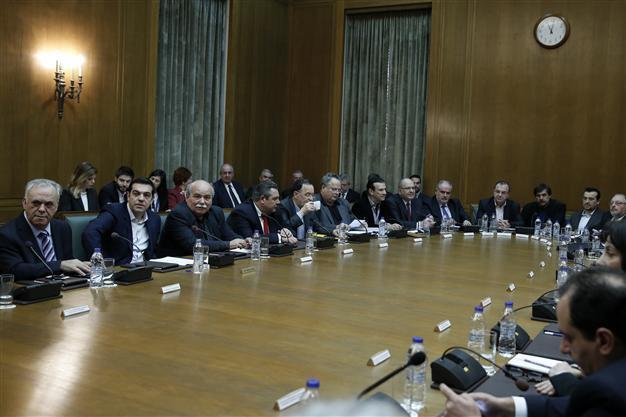Greek government to hold first talks with EU leaders
ATHENS - Agence France-Presse

Greece's Prime Minister Alexis Tsipras, second left, leads the first cabinet meeting of his government at the Parliament in Athens, on Wednesday, Jan. 28, 2015. AP Photo
Greece's radical new government is to hold its first talks with a foreign dignitary on Jan. 29, hosting the head of the European parliament a day after announcing moves to roll back austerity measures.In sweeping announcements two days after taking power, Prime Minister Alexis Tsipras on Wednesday began reversing many of the unpopular measures that underpin Greece's 240-billion-euro ($269 billion) bailout programme.
His "national salvation" government said it was putting on hold plans to sell a majority stake in the ports of Piraeus and Thessaloniki, and would also halt the privatisation of the top electricity and petroleum companies.
The announcements sent the Athens stock market diving by more than 9.0 percent on Wednesday, with major banks tumbling by a quarter.
Chinese media warned Tsipras over halting the privatisation of the Piraeus port, for which China's COSCO group has bid, saying he was in a similar position to the Greek mythological figure of Phaeton, who was given the reins of the sun only to lose control and nearly destroy the earth.
On Thursday, European Parliament head Martin Schulz will visit Athens to hold talks with its new leaders, followed by Jeroen Dijsselbloem, the president of the Eurogroup club of eurozone finance ministers.
Ahead of the dignitaries' visits, the president of the European Commission reiterated that cancelling Greece's huge debt was not an option, urging Athens to "respect... the rest of Europe".
"Greece must comply with Europe," Jean-Claude Juncker said in an interview with French newspaper Le Figaro published Thursday, stressing that "there is no question of cancelling the debt".
"We respect the popular vote in Greece, but Greece must also respect others, public opinion and parliamentarians from the rest of Europe," Juncker said.
"Arrangements are possible, but they will not fundamentally alter what is in place."
"Tsipras promises that Greece will not accept austerity any more. The euro countries respond that there will be no more credit if Greece abandons its commitments," he said.
Following Wednesday's announcements, yields on Greek 10-year bonds rose above the symbolic 10-percent barrier, and ratings agency Standard and Poor's put the country's 'B' credit rating on watch for a possible downgrade, warning the government was heading for a confrontation with its international creditors.
US President Barack Obama phoned Tsipras Wednesday to congratulate him on his election victory -- which puts Greece on a potential collision course with Washington, as well as its European neighbours.
"The president noted that the United States, as a longstanding friend and ally, looks forward to working closely with the new Greek government to help Greece return to a path of long-term prosperity," a White House statement said.
Tsipras, whose Syriza party swept to power on Sunday pledging to end painful austerity after six years of recession, told his first cabinet meeting that Greece was no longer willing to bow to the "politics of submission", in a clear swipe at creditors the EU and the International Monetary Fund.
"Our people are suffering and demand respect... We must bleed to defend their dignity," Tsipras told his ministers, largely a collection of academics who have never served in government.
He said he wanted a "fair, mutually beneficial solution" with Brussels on the bailout.
The new finance minister, maverick economist Yanis Varoufakis, insisted there would be no "showdown" between Greece and the EU, but also called the austerity cuts a "toxic mistake" that ultimately benefited no-one in Europe.
He said the Syriza-led government wanted "a pan-European New Deal" to encourage growth and help the continent deal with Greece's crisis.
The ruling Syriza party has made frequent references to a "New Deal", harking back to the stimulus programme that pulled the United States out of the Great Depression in the 1930s.
In another measure, newly appointed Labour Minister Panos Skourletis said the minimum monthly wage be would be restored to 751 euros -- it had been cut to 589 euros in one of the key reforms demanded in exchange for the bailout.
Following Wednesday's drubbing of banks on the stock market, Deputy Prime Minister Giannis Dragasakis said that any decision on the Greek banking sector would be taken in consultation with private shareholders.
"We are open to ideas and proposals from private shareholders, with the aim of strengthening the banks... and more generally developing our economy," Dragasakis said at the end of an interdepartmental meeting with Tsipras.
Germany, seen in Greece as taking the hardest line over its massive debts, said European solidarity worked both ways and reminded Athens that other EU nations had helped bail out the crisis-hit country.
The new coalition must address an end-of-February deadline set by the EU for Greece to carry out more reforms in return for a seven billion euro tranche of financial aid from the bloc and the IMF.
Tsipras must decide soon whether to delay the deadline.
Time is short. Outgoing finance minister Gikas Hardouvelis said Greece had "quite acute" financing needs in March and could not afford for negotiations to drag on until the summer.
















